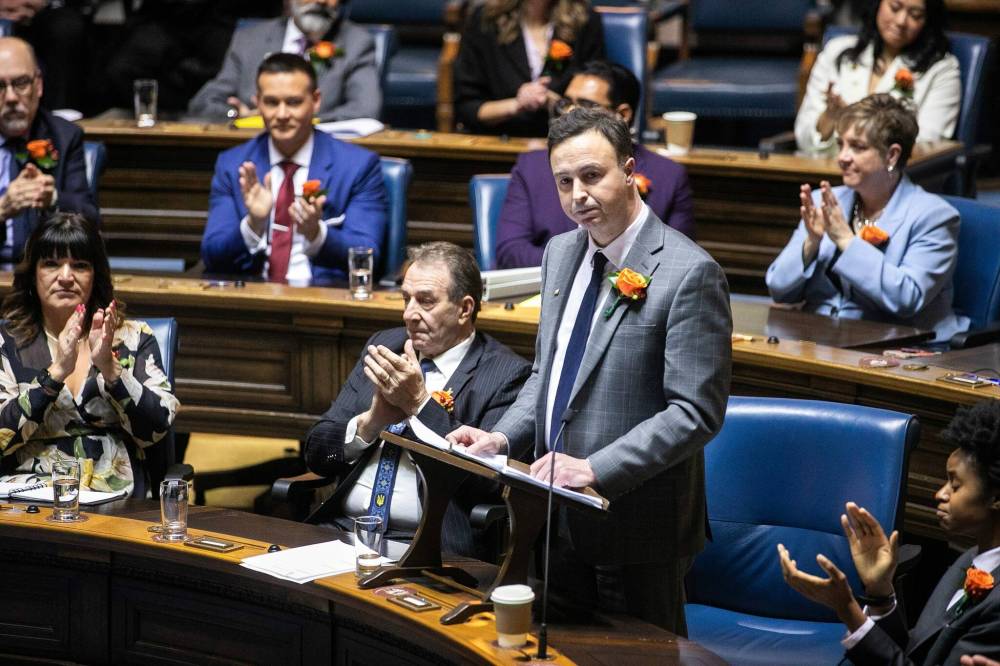Time to face the fiscal facts
Advertisement
Read this article for free:
or
Already have an account? Log in here »
To continue reading, please subscribe:
Monthly Digital Subscription
$0 for the first 4 weeks*
- Enjoy unlimited reading on winnipegfreepress.com
- Read the E-Edition, our digital replica newspaper
- Access News Break, our award-winning app
- Play interactive puzzles
*No charge for 4 weeks then price increases to the regular rate of $19.00 plus GST every four weeks. Offer available to new and qualified returning subscribers only. Cancel any time.
Monthly Digital Subscription
$4.75/week*
- Enjoy unlimited reading on winnipegfreepress.com
- Read the E-Edition, our digital replica newspaper
- Access News Break, our award-winning app
- Play interactive puzzles
*Billed as $19 plus GST every four weeks. Cancel any time.
To continue reading, please subscribe:
Add Free Press access to your Brandon Sun subscription for only an additional
$1 for the first 4 weeks*
*Your next subscription payment will increase by $1.00 and you will be charged $16.99 plus GST for four weeks. After four weeks, your payment will increase to $23.99 plus GST every four weeks.
Read unlimited articles for free today:
or
Already have an account? Log in here »
Sometime soon, Manitoba Premier Wab Kinew and Finance Minister Adrien Sala will be forced to finally admit they are unable to keep their commitment to balance the province’s books before the 2027 provincial election.
It was a reckless promise when it was made during the 2023 provincial election campaign but, two years later, the goal is all but impossible to achieve. In fact, that conclusion should have been obvious as early as March of last year, when Budget 2024 was tabled.
The document contained a series of projections for the 2023-24 through 2027-28 fiscal years that would lead to a modest surplus in fiscal 2027-28.

Mikaela MacKenzie/Free Press Files
Finance Minister Adrien Sala delivers the budget speech in the legislative chamber at the Manitoba Legislative Building in March.
Among those projections, it predicted a deficit of $1.997 billion for the 2023-24 fiscal year, based on revenues of $21.476 billion and expenses of $23.473 billion. By the 2027-28 fiscal year, however, it was estimated that the province’s revenues would swell to $25.966 billion, while expenses would increase to just $25.848 billion. Including a $100-million contingency allowance, the result would be an $18-million surplus.
As I read the Budget 2024 documents in the budget lockup, it was obvious that the projected revenues and expenses that served as the foundation for the government’s path to a balanced budget were wildly optimistic. It predicted a whopping 20.9 per cent increase in provincial revenues by fiscal 2027-28, yet just a 10.1 per cent rise in expenses over that time.
Such revenue growth and expense control would be unprecedented in Manitoba history and unlikely in the post-COVID economy.
That concern was validated by Budget 2025, which revealed that the deficit for the 2024-25 fiscal year was $1.239 billion, far higher than the $796 million deficit that had been predicted for that fiscal year in Budget 2024. Beyond that, Budget 2024 projected the deficit for the current 2025-26 fiscal year to be $532 million, but Budget 2025 says the deficit will be much higher, at $794 million.
That increased deficit figure will likely end up being even larger, given that Budget 2025 did not contemplate the negative economic impact of the wildfire emergency and lower-than-expected Manitoba Hydro revenues caused by low water levels.
Budget 2025 also predicts that government revenues would increase to an astounding $26.982 billion in fiscal 2027-28 — almost $1 billion higher than the amount projected in Budget 2024 — and a staggering 25.6 per cent increase in revenues since fiscal 2023-24. In a slow-growth province like Manitoba, a forecast of such massive revenue growth over such a short period of time is not plausible.
Beyond the sky-high revenue projections, Budget 2024 predicted expenses of $25.848 billion for the 2027-28 fiscal year. Budget 2025 estimates the amount will be more than $1 billion higher, however, at $26,922 billion. Under the province’s fiscal plan, the huge increase in expenses will be offset by the massive increase in revenues, resulting in a $10 million surplus in fiscal 2027-28.
This is “guesstimate budgeting,” rendered even less reliable by the economic turmoil unfolding in Canada, the U.S. and around the world.
Given that reality, the government’s revenue and expense projections for two fiscal years from now — let alone promises of a balanced provincial budget before the 2027 election — should be taken with a very large grain of salt, washed down with a healthy degree of skepticism.
That conclusion should be readily apparent to regular readers of this newspaper, let alone those who are paying attention to what is happening in the economy. And yet, Kinew and Sala stubbornly refuse to face the fiscal facts. They continue to cling to the notion that they can still table a balanced budget before the next election, despite credible economic data which say they can’t.
Manitoba’s NDP government has proven to be quite determined to keep its election promises, but it is time for Kinew and Sala to concede that their balanced budget pledge is beyond reach in the current economic environment.
There is no shame or scandal in making such an admission. To the contrary, it would be regarded by most Manitobans as confirming what most of us already know or suspect. At a time when most politicians duck and spin their way out of difficult situations, it would be a refreshing dose of honesty.
Deveryn Ross is a political commentator living in Brandon.
deverynrossletters@gmail.com
X: @deverynross


